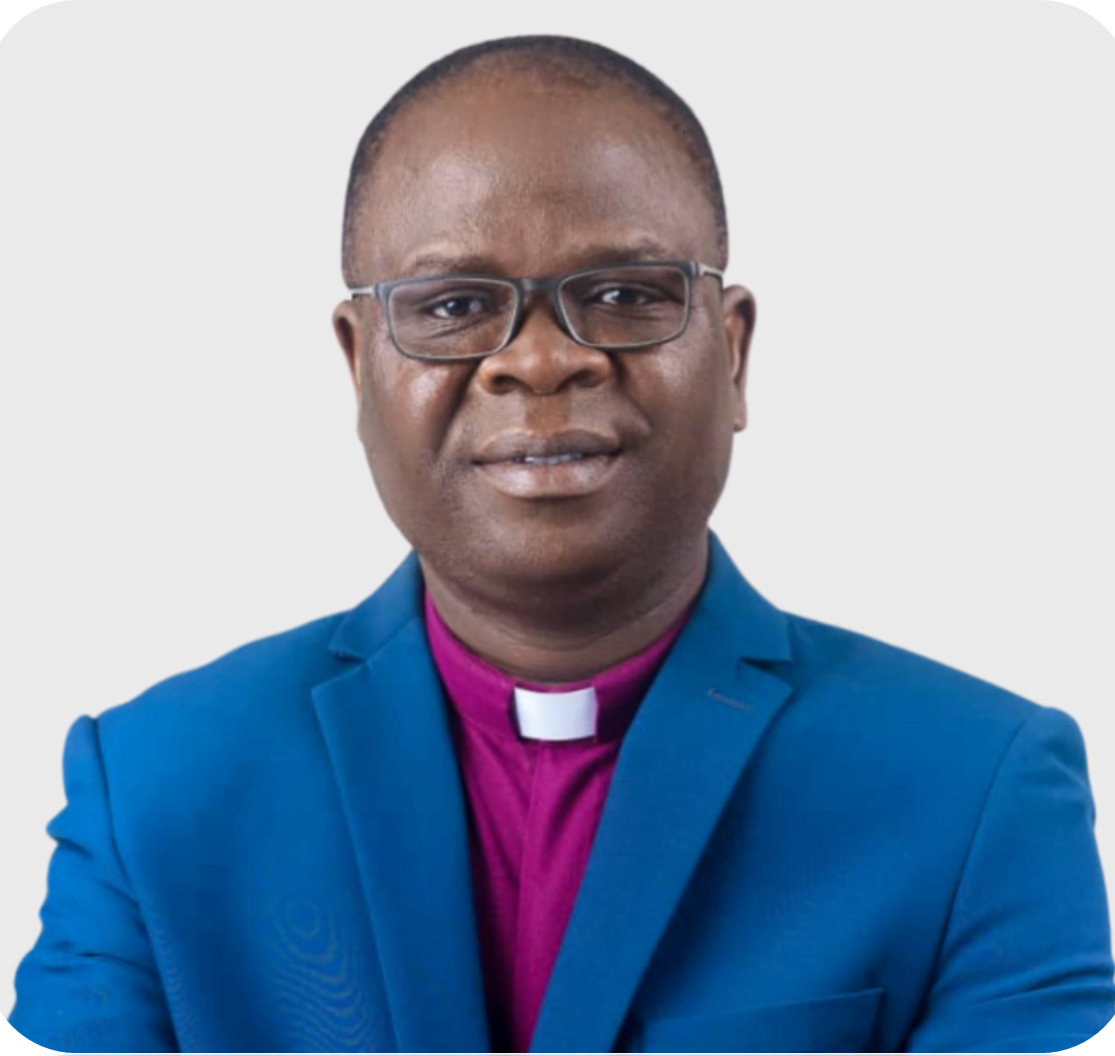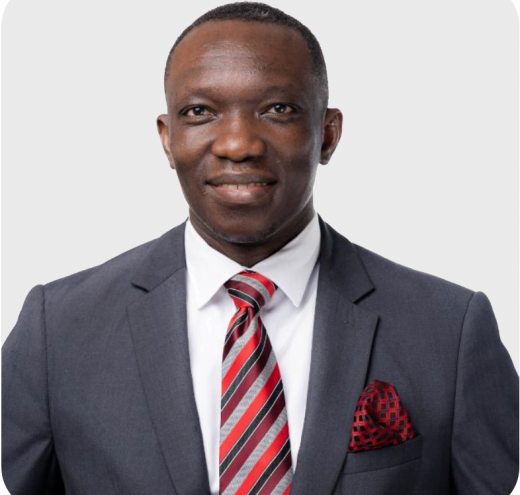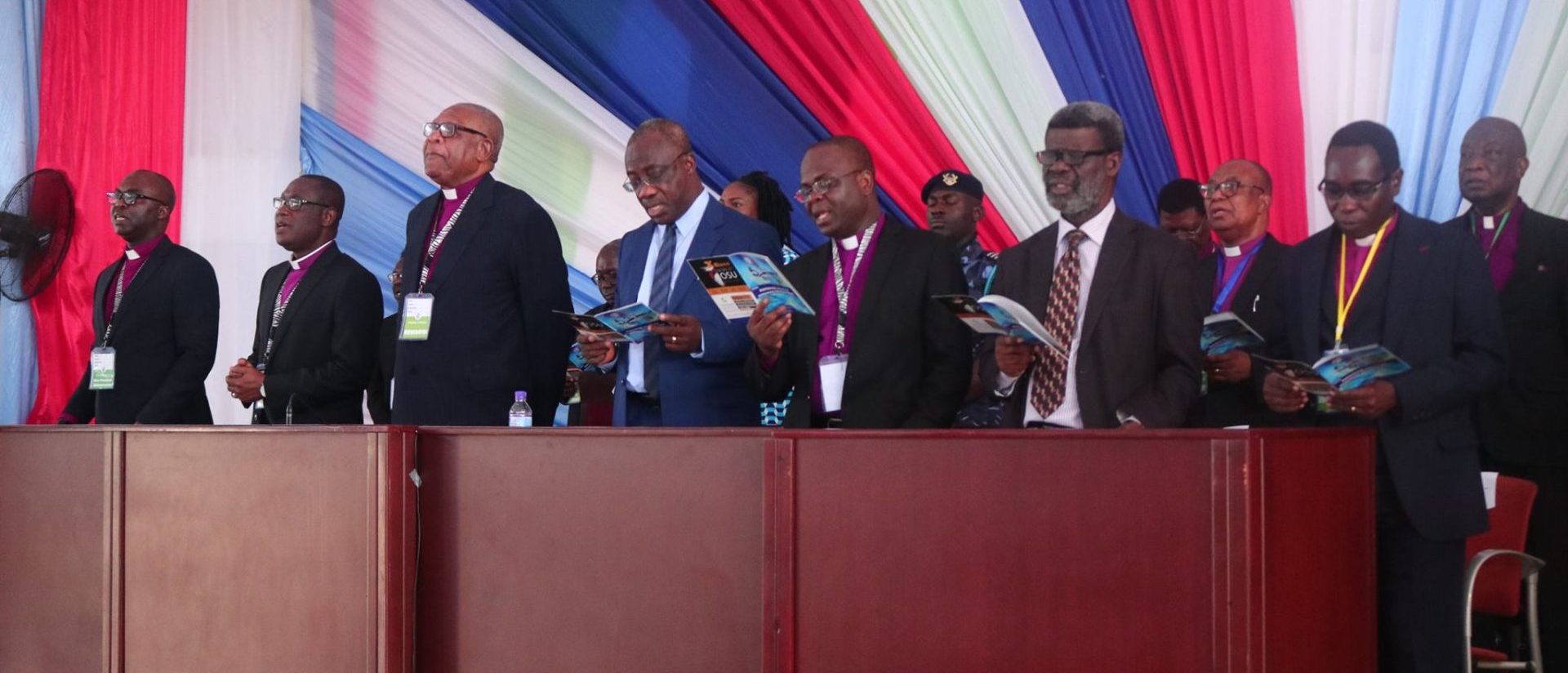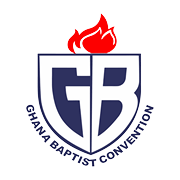About Us
The Ghana Baptist Convention exists to evangelize the lost, disciple believers in the Gospel of Jesus Christ, plant churches, train leaders, and minister to the spiritual and socio-economic needs of people through strong and vibrant structures and institutions, in cooperation with relevant bodies.
To fulfill the Great Commission of Jesus Christ
- Evangelism and missions.
- Church planting and church growth.
- Discipleship and spiritual growth.
- Leadership development and ministerial training.
- Vibrant governance structures and systems.
- Partnerships, cooperation, and socio-economic impact.
Current Executive Team

Rev. Enoch Nii Narh Thompson
Executive President

Rev. Enoch Nii Narh Thompson
Executive President
Rev. Enoch Thompson is a dedicated family man, married to Mrs. Dina Thompson. Together, they are blessed with four young adult daughters. His strong family values and commitment to nurturing his household have been the foundation of his extensive and impactful ministry work.
Educational Background:
Rev. Thompson's educational journey is both extensive and diverse, reflecting his commitment to intellectual and spiritual growth. He earned a Bachelor of Arts in French and Spanish Studies from the University of Ghana, Legon, and the Complutense de Madrid, Spain, in 1990. His theological training began with a Diploma in Theology from Maranatha Bible College (now Maranatha University College) in Sowutuom, Accra, in 1997. He furthered his theological studies with a Master of Divinity in Biblical Studies from Prairie Graduate School in Calgary, Alberta, Canada, in 2000. He also obtained a Master of Philosophy in the Study of Religions from the University of Ghana in 2010. Additionally, he enhanced his leadership skills at the Ghana Institute of Management and Public Administration (GIMPA) in 2020.
Ministry Involvement:
Rev. Thompson's journey in Christian ministry began during his secondary school days and continued through university. His ministry has spanned various roles and geographies, both within and outside Ghana.
Training and Mentorship:
He has been instrumental in training future ministers through his roles at Maranatha University College in Accra, Prairie Graduate School in Calgary, and as an Adjunct Lecturer at Ghana Baptist University College. His dedication to educating others also extends to the training of Children's Sunday School teachers and conducting fieldwork among children.
Pastoral Leadership:
Rev. Thompson has served in multiple capacities at the Messiah Baptist Church for seventeen years, progressing from Administrative Assistant to Associate Pastor, and ultimately to Head Pastor. He also played a significant role at Hope for Life Christian Fellowship in Calgary, Alberta, Canada.
Executive Roles:
His leadership within the Ghana Baptist Convention has been notable, serving as Vice President (Ministries) from 2014 to 2022, and currently as the Executive President. His influence extends to the Christian Council of Ghana, where he is a member of the Executive Committee. In 2023, he was elected to the Executive Committee of the Baptist World Alliance during its Annual Gathering in Norway.
Passion and Vision:
Rev. Thompson is a pastor at heart. He has a great interest in theological reflection and Bible teaching. He is a good team player and a people person with the ability to interact with people from all walks of life with admirable flexibility. Rev. Thompson is serious-minded and still has a godly sense of humor. In his ministry, he combines academic excellence with deep spirituality. His greatest desire is like that of the Apostle Paul in Phil. 3:10-11.

Rev. Charles Oppong-Poku
Vice-President

Rev. Charles Oppong-Poku
Vice-President
From 1988 to 1990, Rev. Oppong-Poku served as an Evangelist of the Hope Baptist Association in the Dunkwa-on-Offin area. He also worked as a Home Missionary for the Sefwi Mission Field from 1994 to 1998. From 1999 to 2000, he was the Pastor of Lofdal Baptist Church in Craifontein, Cape Town, South Africa. He worked as a lecturer at the University of the Western Cape in Bellville, Cape Town, and also at the Christian Service University College in Kumasi. Rev. Oppong-Poku served as the Senior Pastor of Royal Baptist Church, Bibiani, from 2001 to 2004. He was the chairman of the Evangelism and Missions Board of the Convention from 2003 to 2009 and also served on the erstwhile Ghana Baptist Church, Sunyani, from 2004 to 2017. He was appointed the full-time Sector Head for the Mid-Ghana Sector of the Ghana Baptist Convention in 2017 and faithfully served in that office until his election as the Vice President, Ministries.
Rev. Oppong-Poku attended Christian Service University College and obtained a Diploma in Biblical Studies, and an External Diploma in Theology from the University of Ghana in 1993. He obtained a BA Hons (Theology) from the University of the Western Cape, Cape Town, South Africa. He holds an MPhil Degree (Cum Laude) from the University of the Western Cape, South Africa, and also worked as a lecturer at that same university in 2000. Rev. Charles Oppong-Poku is married to Mrs. Theresa Oppong-Poku, and they are blessed with three biological sons and other foster children.

Rev. Tetteh-Annor Larbi
Director General - Finance & Administration

Rev. Tetteh-Annor Larbi
Director General - Finance & Administration
He is a product of the Ghana Baptist University College, where he completed the Bachelor of Theology program with honors. Rev. Larbi also holds a Bachelor of Science degree in Psychology from the University of Ghana, a professional post-graduate Human Resource certificate from the Chartered Institute of Human Resource Management, and a Master of Business Administration from the Kwame Nkrumah University of Science and Technology.
Rev. Larbi comes on board with over 16 years of hands-on experience in Finance, Human Resource Management, and Administration from diverse enterprises in the corporate space. He is married with four children.
GHANA BAPTIST CONVENTION
The Ghana Baptist Convention (GBC) is the largest umbrella organization of Baptists in Ghana.
The GBC consists of 30 Associations across the country, as well as the North American Baptist Association (NABA) and the Central European Baptist Association (CEBA).
The GBC holds membership in various local and international Baptist and ecumenical groups such as the Baptist World Alliance (BWA), the All-African Baptist Fellowship (AABF), the Christian Council of Ghana (CCG), and the Ghana Evangelism Committee (GEC).
The vision of the denomination is to fulfill Jesus’ Great Commission to the early Church, and by extension, to all believers, as stated in Matthew 28:19-20. Its mission is to lead GBC churches to evangelize the lost, disciple believers of the Gospel of Jesus Christ, plant churches, train leaders, and minister to the spiritual and socio-economic needs of people through strong and vibrant structures and institutions, and in cooperation with relevant bodies. Over the last 60 years, the Convention has worked diligently to fulfill its mandate in these notable areas.
Mission Fields
In its quest to spread the gospel throughout Ghana and beyond, the Ghana Baptist Convention (GBC) has established five mission fields: the North-Eastern (Yendi) Mission Field, the Sefwi Mission Field, the Nzema Mission Field, the North Volta Mission Field, and the Navrongo Mission Field. Each mission field is overseen by a home missionary responsible for the work in that area.
With support from foreign partners, these mission fields have planted 1,000 mission churches in the last two decades. However, due to the vast nature of the work and inadequate financial support, as well as a lack of trained leaders and church buildings, some of these mission churches have not survived. Through the efforts of the missionaries, many people have come to know the Lord, and notable social intervention projects have been initiated in these communities, such as the Women Resource Centre in Yendi and the Nzema Baptist Hospital in Nzema.
Church Planting
One major strategy the Convention has used to sustain its church planting activity is the Student Holiday Outreach Programme (SHOP). This programme is undertaken by the National Union of Baptist Students (tertiary students) during their vacation to reach people with the Gospel through missionary activities like revivals, crusades, door-to-door evangelism, street outreach, discipleship training, counselling, and dawn broadcasts. Many churches have been established through the efforts of these students. The Association of Baptist Business Executives (ABBEX) has fully funded this programme since its inception.
Cine Ministry
In 2016, the Convention introduced the Cine Van Ministry to support its evangelism efforts. Each of the four sectors of the Convention was provided with a Cine Van. Through this ministry, about 100,000 people have been exposed to the gospel, and many have come to faith in Christ.
Tele-Evangelism - SBNTV – SBN Media Ghana
Founded in December 2018, Shalom Broadcasting Network embarked on a mission to establish a Christian television network dedicated to spreading the Gospel of Jesus Christ globally through Christ-centered family entertainment. Initially reaching twenty-seven countries in West and Central Africa, along with select areas in East Africa, the network faced financial obstacles leading to the suspension of its satellite TV broadcast. Presently, the Convention is leveraging alternative media platforms to advance its commitment to utilizing digital channels for the propagation of the Gospel.
Baptist Relief and Development Agency
In line with its mission and vision, the Convention established the Baptist Relief and Development Agency (BREDA) in March 2000 to present the gospel through holistic ministry – proclaiming the gospel and meeting the felt needs of believers and their communities. Over the years, BREDA has focused on education and capacity building, relief services, food and agriculture, health, and development projects. BREDA's work has led to the establishment of six Early Childhood Development Centres in deprived communities and the Baptist Vocational Training Centre to train past victims of Trokosi, a practice where girls and women are sent to shrines to atone for the crimes of relatives. Additionally, BREDA has supported girl-child education, income-generating projects, HIV/AIDS campaigns, and advocacy against the Trokosi practice, helping improve the well-being of marginalized individuals.
Baptist Medical Center, Nalerigu
Founded in 1958 by the Ghana Baptist Mission (Foreign Mission Board, now the International Mission Board of the Southern Baptist Convention), the Baptist Medical Center (BMC) in Nalerigu started as an outpatient facility and evolved to include inpatient facilities, a surgical unit, and a residential tuberculosis program by the mid-1960s. In the 1980s, the hospital established a public health program providing vital services to the region, such as vaccinations and engaging with unreached villages. BMC has grown into a major referral facility for the five Northern regions of Ghana and other neighboring countries. It currently has a 310-bed capacity with a separate 70-bed TB village, attracting patients from southern Ghana, Togo, Burkina Faso, and Nigeria. The hospital receives over 80,000 patients annually, performs about 4,000 surgeries, and handles around 2,400 deliveries. It is estimated that the hospital has treated over 3 million patients in the past 60 years. In 2014, the International Mission Board handed over the management of the hospital to the Convention.
GHANA BAPTIST HEALTH SERVICES
Due to the vast impact of BMC, Nalerigu, the Convention established the Baptist Health Secretariat under the supervision of the Medical Services Council to coordinate the activities of all Baptist health facilities. Currently, seven more health facilities have been established by the Ghana Baptist Convention:
1. Tanoah Memorial Baptist Hospital, Opuniase
2. Baptist Medical Centre, Abuakwa
3. Nzema Baptist Hospital, Nvellenu
4. Central Charismatic Baptist Hospital, Gyinyase
5. Sadler Baptist Clinic
6. CCBC Hospital, Mim
7. Living Spring Baptist Hospital, Atasamanso, Kumasi
Two new hospitals are expected to start operation within the next two years: Dunkwa Baptist Hospital and Swedru Baptist Hospital.
Kumasi Academy
Kumasi Academy, previously called Sadler Baptist College, was established by the Ghana Baptist Mission in 1957 at Asokore Mampong alongside the Baptist Seminary, which was later relocated to Abuakwa. Known for its strict and disciplinary training, the school was turned over to the government after the state expressed interest in its operation. Despite handing over the school, the missionaries requested that religious matters be managed by the Baptist mission. Today, Kumasi Academy is one of the educational institutions of the Convention.
Ghana Baptist Theological Seminary / Ghana Baptist University College
The Ghana Baptist Theological Seminary began as a Pastor’s Training School in 1956 alongside Sadler Baptist College. Relocated to Abuakwa in 1960, the school has undergone several name changes until it was decided to call it the Ghana Baptist Theological Seminary. After fifty years of theological education, the Ghana Baptist Convention resolved to establish a University College. The University College was launched and inaugurated on November 25, 2006, under the leadership of Rev. Prof. Samuel Nyarko Boapeah and was christened the Ghana Baptist University College. It currently has five schools: the School of Theology and Ministry, the School of Nursing, the Business School, the School of Art and Social Sciences Education (SASSE), and the Graduate School. Affiliated with the University of Cape Coast, the University College has grown from a handful of students to about 1,400 students. The University College offers undergraduate, postgraduate, and diploma programs with students mostly from Ghana and a few from Nigeria, Cote d’Ivoire, and Equatorial Guinea, pursuing programs in Business Administration, Education in French and English, Theology and Ministry, and Nursing.
Baptist Women’s Retreat Center, Ejura
The Baptist Women’s Retreat Center, Ejura, was built in 1960 through joint contributions from Ghanaian/Nigerian Baptist women and the Southern Baptist Missionary. It was abandoned for many years due to bad road access and the difficulty of accommodating the growing number of Baptist women. In 1999, the WMU undertook a renovation exercise to revamp the facility, and it has since served as a major retreat center for the Convention and its auxiliary groups.
The Convention traditionally used a ceremonial system of presidency, involving the general secretary as the chief executive officer. However, during the 47th Annual Session in 2010, it was decided to adopt a new executive presidency system, making the President the executive leader of the Convention, supported by the Vice President (Ministries) and the Vice President (Administration). This required a review of the existing constitution, leading to the formation of a Constitution Review Committee that drafted a new constitution reflecting the new system. An Implementation Committee was also established to work out the practical and logistical components of the new structure.
At the 50th Annual Session in 2013, the first Executive President and Vice President (Ministries) were elected. Rev. Dr. Ernest Adu-Gyamfi and Rev. Enoch Nii Narh Thompson were elected as President and Vice President, respectively, and assumed office in January 2014. A year later, Rev. Washington Komla Darke was elected as Vice President. At the 58th Annual Session in 2021, Rev. Enoch Thompson and Rev. Charles Oppong-Poku were elected as the second Executive President and Vice President, respectively, for a four-year term. The governance system was further enhanced during the 59th Annual Session through a constitutional review that transformed the Vice-President (Administration) role into a permanent position titled Director-General (Finance and Administration), currently held by Rev. Tetteh-Annor Larbi.


